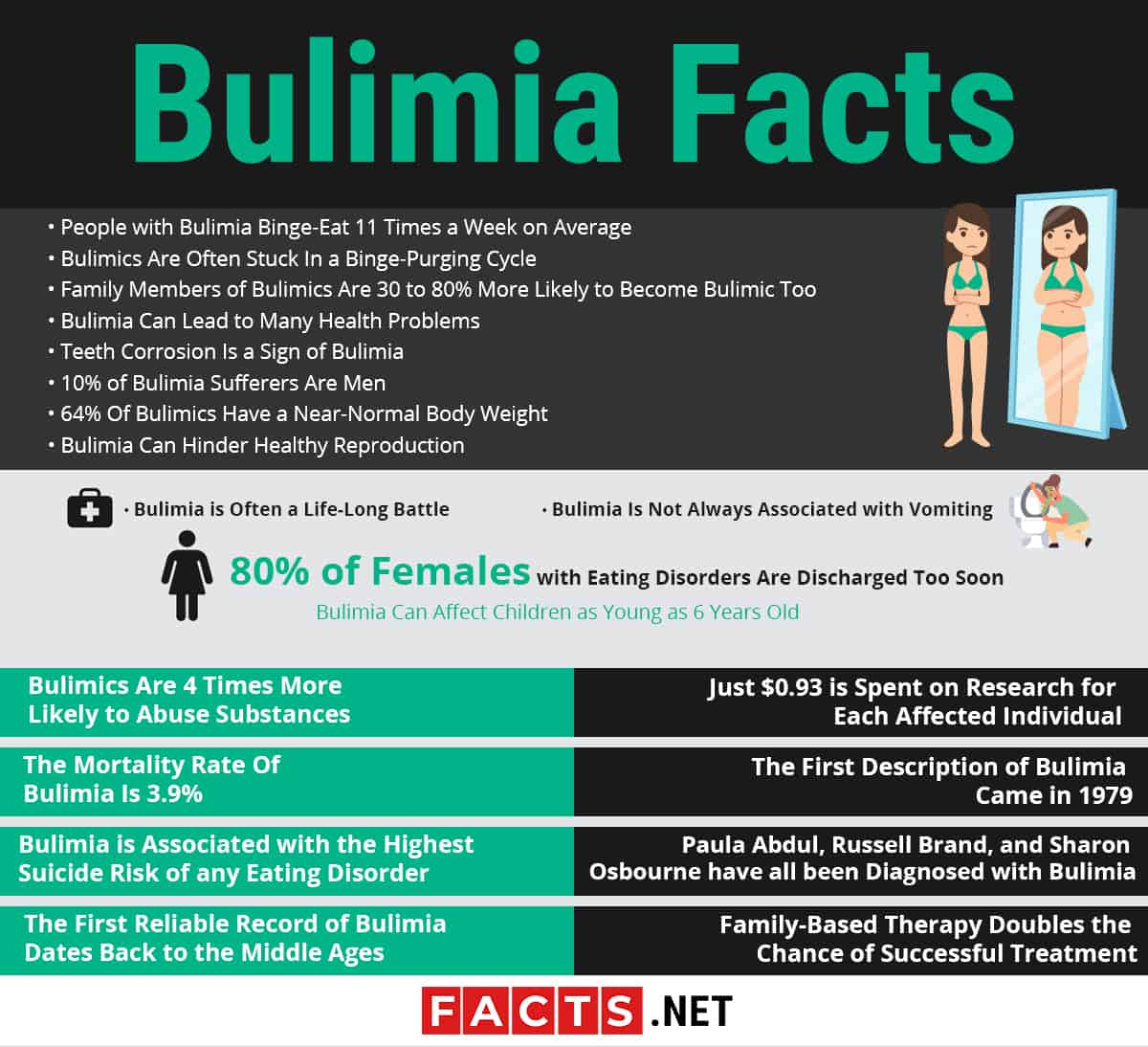
- Name: Bulimia, Bulimia Nervosa
- Signs: Fixation on weight and calories consumed, swelling of the cheeks, depression
- Biological Causes: Abnormal hormone levels
- Social Causes: Body image concerns, low self-esteem, societal expectations
- Side Effects: Weight gain, abdominal pain, sore throat, irregular periods, ulcers
- Treatment: Counselling, medications, nutrition education
- Types: Purging type, non-purging type
- Prevalence: 3 million cases per year in the US
- Diagnosis: Self-diagnosable, lab test rarely required
- Most Common Age Group: 18-59
- Diagnosis: People with Bulimia Binge-Eat 11 Times a Week on Average
- Diagnosis: Bulimics Are Often Stuck In a Binge-Purging Cycle
- Risk Factor: Family Members of Bulimics Are 30 to 80% More Likely to Become Bulimic Too
- Health Risk: Bulimia Can Lead to Many Health Problems
- Sign: Teeth Corrosion Is a Sign of Bulimia
- Patient Profile: 10% of Bulimia Sufferers Are Men
- Sign: 64% Of Bulimics Have a Near-Normal Body Weight
- Health Risk: Bulimia Can Hinder Healthy Reproduction
- Duration: Bulimia is Often a Life-Long Battle
- Type: Bulimia Is Not Always Associated with Vomiting
- 80% of Females with Eating Disorders Are Discharged Too Soon
- Bulimia Can Affect Children as Young as 6 Years Old
- Bulimics Are 4 Times More Likely to Abuse Substances
- Just $0.93 is Spent on Research for Each Affected Individual
- The Mortality Rate Of Bulimia Is 3.9%
- The First Description of Bulimia Came in 1979
- Bulimia is Associated with the Highest Suicide Risk of any Eating Disorder
- Paula Abdul, Russell Brand, and Sharon Osbourne have all been Diagnosed with Bulimia
- The First Reliable Record of Bulimia Dates Back to the Middle Ages
- Family-Based Therapy Doubles the Chance of Successful Treatment
Bulimia Facts Infographics

People with Bulimia Binge-Eat 11 Times a Week on Average

Bulimia and anorexia are two of the most common eating disorders. Bulimics and anorexics are typically very concerned about their body image. However, one of the most basic bulimia facts is that it is characterised by binge eating, which differentiates it from anorexia. While most people with anorexia typically avoid food, bulimics tend to eat an uncontrollable amount of food, often in secret. Statistics show that, on average, people with bulimia binge 11 times a week. This often involves consuming a large amount of food – potentially many thousands of calories – in a short space of time.
Bulimics Are Often Stuck In a Binge-Purging Cycle
Because of the uncontrollable binge-eating, most people with bulimia feel guilty and even more self-conscious about their weight. Bulimia is also characterised by immediate purging following the binge eating. This is usually done in the form of forced vomiting. However, bulimia facts show that many people also try to compensate for the binge-eating by using laxatives, diuretics or stimulants. Others may start fasting or take up excessive exercise. Often, people with bulimia find themselves unable to stop the eating-purging cycle. Many repeat this cycle more than two times a week.
Family Members of Bulimics Are 30 to 80% More Likely to Become Bulimic Too
Research shows that if a member of your family, such as your father, mother, or sibling, has the eating disorder, your risk of developing it also increases. This is especially true if you have a close relationship to the person with bulimia. In fact, having a family member with bulimia can increase a person’s risk of having the disorder themselves by 30 to 80%. Relatives of women who have bulimia are almost 4 times at greater risk of developing this condition. It is not clear yet whether it is genetics or family influence that heightens the risk. However, family history clearly is a factor.
Bulimia Can Lead to Many Health Problems
As an eating disorder, bulimia can wreak havoc on not just a person’s weight, but also on his or her entire body. Every part of our body needs proper nutrition to stay healthy and functional. With bulimia, the excessive eating and then excessive purging or fasting disrupts body functions. Aside from the irregular fluctuation of weight, a person can also experience anaemia, irregular heart rate, irregular menstrual cycle, low blood pressure, ulcers, kidney failure and many other serious conditions. Because of the immense guilt and fixation on weight associated with the disorder, bulimics often suffer from severe depression and other mental illnesses.
Teeth Corrosion Is a Sign of Bulimia
Bulimia facts show that teeth corrosion can be used as a sign to diagnose bulimia. Every time a person vomits, stomach acid is brought into their mouth, along with everything else. This shouldn’t cause too many problems if vomiting is a rare occurrence. However, people with bulimia tend to engage in excessive vomiting quite often, sometimes after every excessive meal. The repeated presence of this strong acid corrodes their teeth and the signs are usually quite visible. Aside from teeth corrosion, frequent forced vomiting may also leave other tell-tale signs, such as scarring on the hands (from being forced down the throat), or swollen cheeks.
10% of Bulimia Sufferers Are Men
When talking about bulimia facts or any other eating disorder, there is a common misconception that such conditions are exclusive to women. While the majority of people with bulimia are female, there are a significant number of suffering men as well. It is estimated that 10% of people who suffer from bulimia are men. The condition is far from gender specific. The bad news is that while men are less likely to develop bulimic behaviours than women, it is also much less likely for them to get diagnosed and seek help. This can pose dangerous threats to their health without anyone noticing.
64% Of Bulimics Have a Near-Normal Body Weight
A common misconception about bulimia facts is that people with bulimia are extremely thin like anorexics. However, this is far from the truth. In fact, 64% of people with the bulimia condition have a near-normal body weight. If you judge solely by weight to determine if a person is bulimic or not, chances are, you will miss the majority of bulimics. While bulimics are extremely concerned about their weight and body image, they also have a tendency to consume a high number of calories during their binge-eating sessions. Even purging cannot reverse 100% of the calorific intake. This means many people with bulimia can still have a normal body weight, or can even become overweight.
Bulimia Can Hinder Healthy Reproduction
Most bulimia facts clearly show that the eating disorder can cause damage to different bodily functions, and that includes the reproduction system. A woman with bulimia will often experience irregular menstrual cycles. Even when her periods get back to a regular cycle, there may be other lasting effects beyond that. Bulimia can hinder conception, and can affect the baby’s health if a sufferer does become pregnant. The risk of damage to the baby is especially high if a woman is actively bulimic during her pregnancy. Potential risks include miscarriage, stillbirth, and birth defects.
Bulimia is Often a Life-Long Battle
People with bulimia can be stuck in the endless cycle of excessive eating and purging for a long period of time. Many people struggle for years before anyone notices, or before they seek help, and in many cases, this simply never happens. According to the National Association of Anorexia Nervosa and Associated Disorders (ANAD), only 1 out of 10 people who have eating disorders seek treatment. Even after receiving treatment, although symptoms can improve, they can also come back at a later date. The eating disorder can be triggered by a number of factors. For example, some people start to binge due to emotional stress. After getting treated for bulimia, they may later start binge-eating again when going through emotionally difficult times.
Bulimia Is Not Always Associated with Vomiting

Although vomiting is a tell-tale sign by which to recognise a bulimic, not all people with bulimia force themselves to vomit after meals. Similarly, not all bulimics take laxatives or diuretics. Such bulimics are categorised in a separate type of bulimia: the non-purging type. Instead of purging, this group tends to compensate for their binge-eating in different ways. Many people starve themselves for a period of time immediately after the binge. Others force themselves to exercise excessively. It is important to understand that other excessive behaviours can be just as harmful as purging.
80% of Females with Eating Disorders Are Discharged Too Soon
There are many bulimia facts that show that this is a lasting condition and that sufferers have a high chance of relapsing. Treated patients can easily fall back into their disordered behaviour. This means that bulimia treatments usually have to take three to seven years. Very few people can successfully be treated within a year, and this is also true of many other eating disorders. However, it is estimated that up to 80% of females who suffer from eating disorders, including bulimia, are discharged too soon from treatment programs.
Bulimia Can Affect Children as Young as 6 Years Old
There are many sad bulimia facts, and one of them is that this eating disorder can start at a very young age. Children as young as six years old have been diagnosed and even hospitalised with bulimia. In a survey, 81% of 10-year-olds said that they were scared of being fat. This led to a growing number of bulimia cases in women aged between 10 and 39 years old. The number of bulimia cases in women in this age group tripled from 1988 to 1993. It is estimated that up to 20% of high school and college females have a type of eating disorder, such as anorexia, bulimia or binge-eating. Statistics, however, again show that eating disorders are not exclusive to females. The Centre for Disease Control estimated that one out of every four high school boys also struggles with eating disorders.
Bulimics Are 4 Times More Likely to Abuse Substances

Compared with the population as a whole, a person with bulimia is four times more likely to abuse alcohol or another substance. It is also more common for women with bulimia to abuse substances than women with anorexia. Bulimics tend to resort to alcohol, amphetamines, cocaine, marijuana and tranquillisers to cope with emotional distresses, guilt, and shame. Coupled with irregular, unhealthy diets and deteriorating health, substance abuse can become very dangerous, and even fatal in some cases. Many people who suffer from bulimia actually die as a result of substance abuse rather than bulimia itself.
Just $0.93 is Spent on Research for Each Affected Individual
Bulimia facts show that it is a widespread condition that affects millions of people and causes serious health issues. However, it still receives inadequate attention and, therefore, inadequate funding for research. In 2011, the National Institutes of Health estimated that for each person affected by bulimia, only $0.93 was spent on research. This amount is tiny compared to the research dollars spent on Alzheimer’s, at $88 per affected individual. The amount spent on researching schizophrenia is $81 per affected individual, and autism $44.
The Mortality Rate Of Bulimia Is 3.9%
Many people falsely think that while bulimia can cause serious health consequences, it is not fatal. However, many fatal cases of bulimia have been recorded. The mortality rate of bulimia is 3.9%. Although this percentage might not seem all that high initially, it is quite startling for a condition that can develop from social influence and expectations. The cause of death among people with bulimia can be starvation, suicide, and substance abuse. It is also estimated that as many as 20% of affected individuals would die without treatment.
The First Description of Bulimia Came in 1979
Bulimia and other eating disorders have been present throughout history. However, bulimia facts show that the first description of bulimia was credited to a psychiatrist named Gerald Russell. In 1979, Russell published what is known now as the first description of bulimia, noting scarring on the hands of bulimics. This is caused by the repeated rubbing of teeth on the hand, when the person induces forced vomiting. The scarring on the hands is now known as “Russell’s signs”.
Bulimia is Associated with the Highest Suicide Risk of any Eating Disorder
People with bulimia are often diagnosed with depression or bipolar disorder. While healthcare providers generally focus on the long list of physical health issues, such as heart problems, blood pressure issues, and others, it is common to overlook the risk of suicide presented by mental health problems. However, this is an important cause of death in bulimia. In research by Florida State University, survey results show that the highest rates of suicide risk were among bulimics, followed by anorexia sufferers, and then individuals with other eating disorders.
Paula Abdul, Russell Brand, and Sharon Osbourne have all been Diagnosed with Bulimia

The risk of bulimia is higher among certain professional groups, such as models, dancers, and other performers. The condition can affect anyone, including some of our favourite celebrities.
Paula Abdul revealed in an interview in 1995 that she had been fighting bulimia for 17 years. The popular singer received extensive therapy for her problems at a psychiatric clinic. Russell Brand also started binge-eating and vomiting at the very early age of 11. Sharon Osbourne blamed her low self-esteem for the fact that she had failed to stop bulimic behaviours even after 35 years of living with the disorder.
The First Reliable Record of Bulimia Dates Back to the Middle Ages
There are many bulimia facts relating to cases in the 20th century. It is believed that it is around this time that the thin figure became a beauty ideal, and people started to become increasingly concerned about their weight. However, bulimic behaviours such as binge-eating and purging started much earlier. There are reliable descriptions of bulimia from as early as the Middle Ages. At this time, bulimic behaviours were described among the wealthy. However, instead of being overly concerned about their weight, the people at the time only vomited during meals so that they could eat more food.
Family-Based Therapy Doubles the Chance of Successful Treatment
One of the rare pieces of good news relating to bulimia facts is that this condition is fully treatable. People who are diagnosed with bulimia can receive counselling, medication, and nutrition education. Recent research at the University Of Chicago Medical Centre shows that family-based therapy is also a very effective method of treating bulimia. With family-based treatment, 40% of adolescents were able to successfully quit binge-eating and purging. This method is twice as successful as cases where the patients only receive individual therapy. Only 18% of such patients fully stopped bulimic behaviours.
Bulimia Facts – Facts about Bulimia Summary
 There are many startling bulimia facts that can help us understand this eating disorder. The condition often involves binge-eating and then purging in the form of vomiting or taking laxatives. There is also a type of bulimia called non-purging bulimia where people fast or exercise excessively instead. The condition can have life-threatening consequences and can affect children as young as six years old. People with bulimia have higher a risk of suicide and substance abuse. The condition is not gender-specific, and some well-known celebrities have battled the disorder. Despite the prevalence of the condition, it still receives inadequate funding for research.
There are many startling bulimia facts that can help us understand this eating disorder. The condition often involves binge-eating and then purging in the form of vomiting or taking laxatives. There is also a type of bulimia called non-purging bulimia where people fast or exercise excessively instead. The condition can have life-threatening consequences and can affect children as young as six years old. People with bulimia have higher a risk of suicide and substance abuse. The condition is not gender-specific, and some well-known celebrities have battled the disorder. Despite the prevalence of the condition, it still receives inadequate funding for research.
Was this page helpful?
Our commitment to delivering trustworthy and engaging content is at the heart of what we do. Each fact on our site is contributed by real users like you, bringing a wealth of diverse insights and information. To ensure the highest standards of accuracy and reliability, our dedicated editors meticulously review each submission. This process guarantees that the facts we share are not only fascinating but also credible. Trust in our commitment to quality and authenticity as you explore and learn with us.


